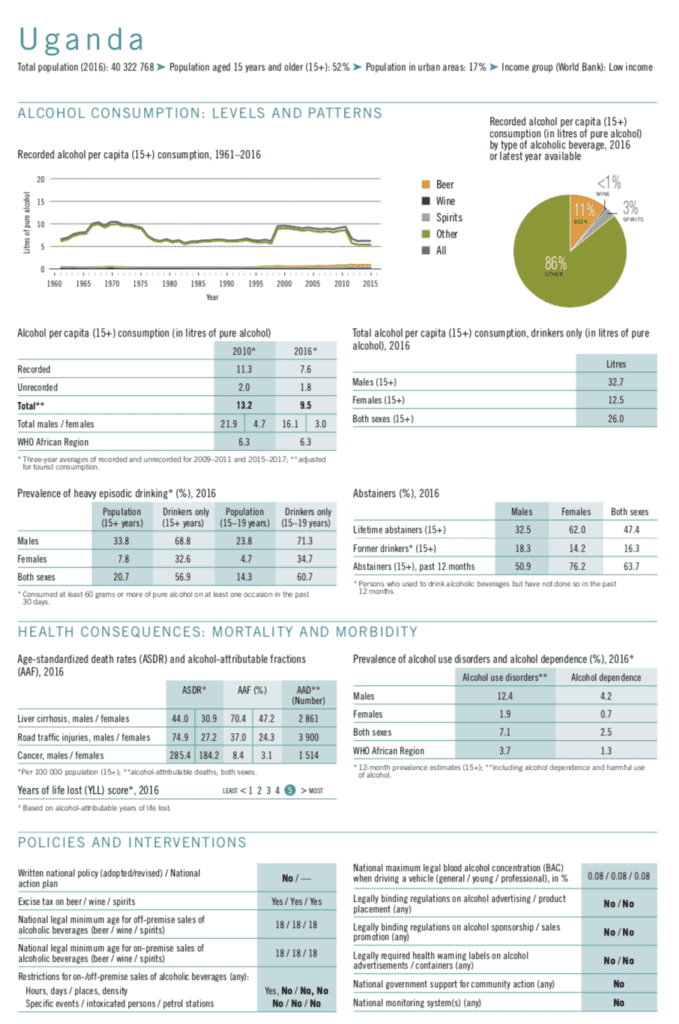MP Sarah Opendi has gotten the support of the Parliament to draft the Alcohol Control Bill. MP Opendi pointed out to her colleagues that the existing legislation regulating the manufacture, sale, and consumption of alcohol products is outdated and does not address the current issues and harms faced by Ugandan people and communities.
Some of the current alcohol laws in Uganda, such as The Liquor Act Cap. 93, The Portable Spirits Act Cap. 97, and the Enguli Act (Manufacturing and Licensing Act Cap. 86) were enacted as far back as the 1960s.
The current legislations have their weaknesses and we need stringent measures or penalties to control the consumption of alcohol and also its production in the country,” said Ugandan MP Sarah Opendi, as per Nation Times.
Sarah Opendi, Member of Parliament, Uganda
The proposed measures by MP Opendi include:
- Prohibit the manufacture and sale of alcohol without a license.
- Propose to penalize breaking this law with a fine of 500 currency points equivalent to Shs10M or imprisonment not exceeding 5 years or both.
- Opening hours for alcohol sales between 12 noon to 6:00 PM. Except for supermarkets, mobile vans, deports, and wholesale shops.
- Propose a fine of Shs20M or imprisonment for 10 years for breaking this law.
- Prohibit the sale of alcohol inside passenger vehicles, sale to law enforcement officers, and the sale of alcohol to persons below 18 years.
- Propose a fine and imprisonment of 3 to 10 years for breaking this law.
While the development of a modern and evidence-based alcohol law has stagnated in Uganda, alcohol harm has increased in the country. As reported by the World Health Organization, total per capita alcohol consumption in Uganda in 2016 was 9.5 liters which is above the average of the WHO Africas region. Among those who use alcohol over 15 years of age, male total per capita consumption is 32.7 liters – which is very high.
The Speaker of the Parliament Anita Among and MP Rose Obiga who supported the draft bill, both highlighted that heavy alcohol use among men is leading to severe social harm: abandoned families and increased domestic violence.
Ugandan men themselves are also suffering due to heavy alcohol consumption. The WHO reports that 12.4% of Ugandan men have an alcohol use disorder, with 4.2% being dependent on alcohol.
A new and improved public health oriented alcohol law is needed precisely because all Ugandans – men, women, children, families, and communities – are negatively affected by the harms due to alcohol.
Deputy Attorney General, Jackson Kafuuzi attempted to block the private member’s bill by MP Opendi from being tabled on grounds that it would impose a charge on the consolidated fund. However, the Speaker put the question to a vote and the majority of MPs agreed to let MP Opendi table the bill.
Big Alcohol exploits the lack of evidence-based alcohol laws in Uganda to increase sales and profits at the cost of health and well-being of people and communities
The lack of evidence-based policy solutions in Uganda is caused and exploited by the alcohol industry. Alcohol companies seek to saturate the country with more alcohol products.
A clear example comes from how Big Alcohol exploited the COVID-19 pandemic to heavily market alcohol, expand e-commerce, and start on-demand delivery services in Uganda. Big Alcohol giant Uganda Breweries Limited (UBL) is also lobbying to weaken alcohol taxes in Uganda, all the while profiting from pandemic exploits. The company recorded a 33% growth in revenue for the year ending in June 2021.
The alcohol industry has been interfering with and obstructing public health-oriented alcohol policy-making in Uganda for a long time. This continuing policy interference was a major obstacle to the adoption of Uganda’s national alcohol policy.
There is no better time than now for Uganda to improve alcohol laws and protect all Ugandan citizens from the harms caused by the products and practices of the alcohol industry.

